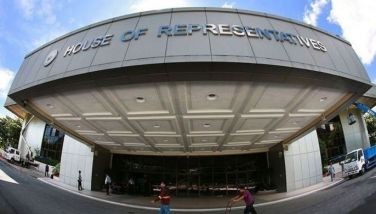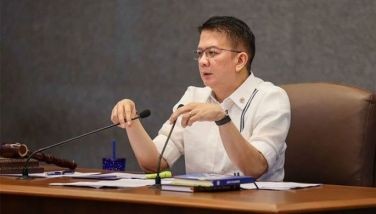Gov't to Sayyaf: No troop pullout
The government has rejected a key demand by the Abu Sayyaf that the military pull out from an area where they are holding 21 mostly foreign hostages in Sulu, Press Secretary Ricardo Puno said yesterday.
He said the military has given "enough space" for the Muslim extremists following the lifting of a military cordon around their hideout in the capital of Jolo.
The Abu Sayyaf had sought a complete pullout of troops before formal talks can start with a government-sanctioned panel for the release of the hostages, including a German woman who is reportedly very ill.
But Puno said "the military had given the group enough space and no chance encounters (between the Army and the guerrillas) took place last week," according to ABS-CBN television station.
The Abu Sayyaf rebels are holding hostage nine Malaysians, a German family of three, a French couple, two Finns, a South African couple, two Filipinos and a Lebanese.
They were seized on April 23 from the Malaysian resort island of Sipadan and brought to Jolo by boat by the Abu Sayyaf, the smaller of two Muslim separatist groups in Mindanao.
Puno's statement came as a special Cabinet panel on the hostage crisis met late Sunday to discuss a set of initial demands by Abu Sayyaf guerrillas before talks start this week on their written demands.
President Estrada was meeting yesterday government-sanctioned negotiators in the hostage crisis in a bid to break the impasse before he leaves today for a five-day state visit to China.
Robert Aventajado, the presidential adviser on flagship projects who was appointed by the Chief Executive to oversee negotiations, said they will fly back to Jolo today after Mr. Estrada had given them the go-signal to "respond to the conditions" set by the rebels.
"So, we will be sitting across these people (rebels) by Wednesday," he said.
Aventajado said that the Abu Sayyaf had already evolved into an apparent collective leadership after their leader, Abdurajak Janjalani, was shot dead by the police in December 1998.
"There was not a single personality that emerged as a leader of the Abu Sayyaf," he told reporters.
"We thought that they should decide first among themselves what demands they would like to give us, so we would know that we are addressing the real demands of the Abu Sayyaf leadership," he said, following reports of different demands from up to six self-proclaimed leaders of the extremists.
Puno said Mr. Estrada demanded a written document "because this is the only paper that you are going to hold them to. Because later on they might say, 'that's not my demand, that's his'."
The Abu Sayyaf maintained that it would not discuss releasing the 21 hostages unless the government ceased its military operations in Jolo and nearby Basilan, the guerrilla group's stronghold.
"The negotiations won't start unless the military stops all operation in Basilan and Sulu provinces," Abu Sayyaf spokesman Abu Ahmad told Radio Mindanao Network, monitored in Zamboanga City.
He said the rebels also wanted a face-to-face meeting with Armed Forces chief Gen. Angelo Reyes and Philippine National Police chief Director General Panfilo Lacson for the release of the hostages.
"We have a united decision. We (rebel leaders) should sit down all together and negotiate with the government but before this begins, the government should stop all military operations in Basilan and Sulu," Ahmad said.
Negotiators dealing with the Abu Sayyaf rebels beat a retreat to Manila on Sunday after failing to win the freedom of any of the captives, including German teacher Renate Wallert, 57, who is suffering from hypertension.
They warned not to expect a quick end to the crisis before consultations with Mr. Estrada on the stack of demands handed over by the rebels on Saturday.
Late Sunday, a French television station broadcast an interview with the hostage-takers' leader, the self-styled Commander "Robot," in which he restated the group's longstanding demands.
"We would like the Philippine government to restore our ancestral lands, that's to say the provinces of Mindanao and Palawan, so that we can establish an Islamic government here," he said.
Meanwhile, the Department of Foreign Affairs appealed to journalists, especially those from foreign news agencies, to stop giving money to the Abu Sayyaf just to have an interview with the rebels.
Foreign Affairs Secretary Domingo Siazon Jr. said authorities confirmed that some journalists had paid the rebels for an audience.
Although Siazon did not say how much had been given to the rebels, he said he is dissuading such a practice because this might only encourage the extremists to prolong the situation.
"If they are paying money to the hostage takers, this will only prolong the situation because there is money flowing in," he said.
In Basilan, government troops tasked to rescue the nine remaining Filipino hostages continued with their offensive, according to AFP Southern Command spokesman Col. Hilario Atendido.
He said the military has sent a small number of elite troops to hunt the rebels.
Basilan Gov. Wahab Akbar said soldiers were focusing their operations in Lantawan town, a predominantly Muslim community where the rebels are believed to have sought refuge with some of their hostages.
He said the rebels had also divided their hostages into four groups to confuse the military.
In a related development, immigration authorities at the Ninoy Aquino International Airport foiled an attempt by an Egyptian national, who is suspected to be a courier of the Abu Sayyaf, to meet with leaders of the extremist group last Sunday in Mindanao.
Mohssen Abdel Ilady Elsayed Lashin, 33, who arrived on board a Saudi Airlines flight from the Middle East, tried to pose as a tourist bound for Iligan City.
However, he was found to have in his possession several pieces of paper, which has instructions for him to meet with "contacts" at a rendezvous site in Iligan City.
In a report to Immigration Commissioner Rufus Rodriguez, NAIA's immigration supervisor Danilo Almeda said the Egyptian claimed he was a plumber, but he later admitted to be an engineer and a chemist.
The Egyptian also claimed that he came to Manila to visit his girlfriend in Iligan City, but the seized papers showed that he must meet with his contacts at a designated area there.
He later admitted that he was not a tourist.
According to immigration sources, the Egyptian was to deliver "important messages" to the rebel group on how to engage the government on a "war of attrition."
The foreigner was later ordered to board the same Saudi Airline flight to the Middle East.
In other developments yesterday, the leading institute of mainstream Islam on Sunday denounced as un-Islamic the kidnappings by Muslim rebel groups in the Philippines.
The Permanent Committee of Al-Azhar for Dialogue with the Monotheistic Religions "expresses great concern and condemns the violent actions of groups in the Philippines who claim to be motivated by Islam."
"Such acts of violence have nothing to do with Islam as a religion. The Muslim religion promotes peace, brotherhood and justice," the committee quoted the Grand Sheik of Al-Azhar, Mohammed Sayed Tantawi, as saying.
"It is better to make individuals accountable for their own actions rather than hold a religion like Islam accountable," Tantawi said in the statement faxed to The Associated Press in Cairo.
The committee is an official organization of Al-Azhar institute, the leading and oldest institute of Sunni Islam. The committee promotes dialogue and understanding between the monotheistic religions.
In a related development, the foreign affairs department reported that the number of arrested and deported Filipinos in Malaysia went up by 6.75 percent from 1,755 to 1,882.
However, the DFA said in a statement that "the Malaysian government has already given its assurance that the crackdown on illegal Filipino immigrants in East Malaysia would cease for the time being."
It added "the round-ups are part of normal Malaysian procedures and should not be related to the Sipadan incident."
The Philippine government asked Malaysia earlier to stop its crackdown on Filipino illegals in Sabah to avoid the issue to be interpreted as a retaliation to the kidnapping of 21 tourists and resort workers.
Siazon also expressed concern over the manner Filipinos were rounded up because there were claims that they were maltreated.
The foreign affairs secretary said he had tackled the issue privately with Minister Datuk Pandikar Amin Haji Mulia of the Prime Minister's Department during the latter's visit here recently. --
- Latest
- Trending
































